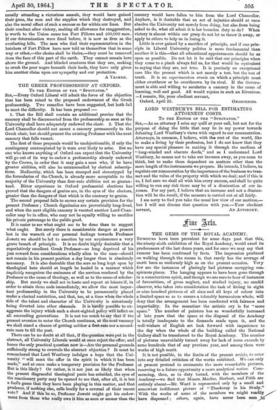THE GREEK PROFESSORSHIP AT OXFORD.
To THE EDITOR OF THE "SPECTATOR."
SIR,—Every Oxford Liberal will admit the force of the objection that has been raised to the proposed endowment of the Greek professorship. Two remedies have been suggested, but both fail to meet the difficulty. It has been proposed :-
1. That the Bill shall contain an additional proviso that the canonry shall be disconnected from the professorship so soon as the University shall have adequately endowed the chair. 2. That the Lord Chancellor should not annex a canonry permanently to the Greek chair, but should present the existing Professor withlhe next canonry that falls vacant.
The first of these proposals would be unobjectionable, if only the contingency contemplated by it were ever likely to arise. But no one who knows anything of Oxford can expect that the University will go out of its way to endow a professorship already endowed by the Crown, in order that it may gain a man who, if he have greater abilities, will also be untrammelled by clerical subscrip- tions. Mediocrity, which has been stamped and stereotyped by the formularies of the Church, is already more acceptable to the majority of the University than first-rate abilities not so guaran- teed. Bitter experience in Oxford professorial elections has proved that the dangers of genius are, in the eyes of the electors, greater than the dangers of that which is the contrary to genius.
The second proposal fails to secure any certain provision for the present Professor ; Church dignitaries are proverbially long-lived, and when the next eligible canonry is vacated another Lord Chan- cellor may be in office, who may not be equally willing to sacrifice his private patronage to the public good.
It is easier to see what ought not to be done than to suggest what ought. But surely there is considerable danger at present lest in the warmth of our personal feelings towards Professor Jewett we should be led to sanction by our acquiescence a very grave breach of principle. It is no doubt highly desirable that a superlatively excellent Greek Professor—so long deprived of his just reward from considerations wholly alien to the case—should not remain in his present position a day longer than is absolutely necessary. It is also desirable that the sore so long kept open by theological hate should at length be healed in a manner which implicitly recognizes the eminence of the services rendered by the Professor to the cause of theology, as well as to the cause of scholar- ship. But surely we shall act in haste and repent at leisure if, in order to attain these ends immediately, we allow the most impor- tant professorship in the University to be permanently placed under a clerical restriction, and that, too, at a time when the whole tide of the talent and character of the University is notoriously being diverted into other channels. It is hardly possible to ex- aggerate the injury which such a short-sighted policy will inflict on all succeeding generations. It is not too much to say that if the present aversion to enter the Church continues, at the next vacancy we shall stand a chance of getting neither a first-rate nor a second- rate man to fill the post.
There can be no doubt at all that, if the question were put in the abstract, all University Liberals would at once reject the offer; and hence the only practical question now is—Are the personal grounds sufficiently strong to overrule the abstract objection? It must be remembered that Lord Westbury indulges a hope that the Uni- versity "will meet the offer in the spirit in which it has been made," and at once make a temporary provision for the Professor. But is this likely? Or rather, is it not just as likely that when the present disgraceful theological panic has subsided, the eyes of the reactionary party may be opened to see that, after all, it is but a fool's game that they have been laying in this matter, and that prudence, if nothing else, calls loudly for a reversal of their recent vote ? And if this be so, Professor Jowett might get his endow- ment from those who really owe it him as soon or sooner than the
canonry would have fallen to him from the Lord Chancellor. Anyhow, is it desirable that an act of injustice should at once absolve the University not merely from doing, but also from being asked to do, what all admit it ift her bounden duty to do ? When victory is almost within our grasp do not let us throw it away, or apply to others to help us in losing it.
Little is ever gained by a sacrifice of principle, and if one prin- ciple in Liberal University politics is more fundamental than another it is this—that all educational appointments should be as open as possible. Do not let it be said, that our principles when they come to a pinch always fail us, for that would be equivalent to saying that they are, not true. It is precisely an exceptional case like the present which is not merely a test, but the teat of truth. It is an experintentum crude on which a principle must either overthrow or be overthrown by its rival. If the Govern- ment is able and willing to secularize a canonry in the cause of learning, well and good. All would rejoice in such an Eirenicon. —I remain, Sir, your obedient servant, Oxford, April 25. OXONIENBIS.


































 Previous page
Previous page